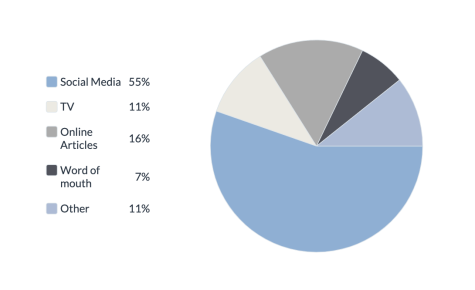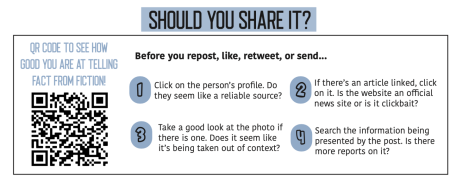Are You Misinformed?
August 18, 2022
The sound of your alarm jolts you awake at 6:30 a.m. and you roll over to grab the first thing that gets your attention: your phone.
The darkness of your room is interrupted by the familiar white light radiating from your phone screen. You lie there mindlessly scrolling through whatever social media app that appeals to you that morning while absorbing information. Eventually the time has come where you have to rush to get ready for the day, and then, when you’re done getting ready, you get right back on your phone.
This morning routine is fairly common for younger people. Our phones connect
us to the surrounding world. We can watch how others live, read about world news, get answers to any questions, and most of all, we can keep ourselves entertained through a small screen that holds our lives within its metaphorical hands.
With cell phones being the center of life for many people around the world, they also happen to be the main news source for many people. Social media platforms such as Twitter, Instagram, TikTok, Facebook and Snapchat have news articles circulating constantly, providing its members with worldwide updates, problems and more.
“I think [getting news from social media] is great,” government and global issues teacher Nicholas Scheuerman said. Whether it’s graphics that are pleasing to the eye reporting worldwide issues or a post from an official news account allowing viewers to read a sample from a current article, social media can be a good tool for news delivery.
“I get a lot of my news from independent journalists on Twitter,” senior Zeke
Greenwald said, “I like the uncensored side of news that is portrayed on social media.”
But while social media can give a different perspective to relatively anything someone is willing to learn more about, it can also give out false information.
“There’s misinformation everywhere, no matter where you look,” Greenwald said.
As news travels through the many spiderwebs of the internet, anyone has
the ability to change wording in order to receive a different reaction from its readers and facts have the potential to become exaggerated or even get altered. Psychology and sociology teacher Geneva Grogan spoke on the matter.
“Framing is how you word questions or issues that cause people to think about them in a certain way,” Grogan said, “That’s a huge part of the psychology of politics, how you word things to make people agree with your point.”
Politicians are not the only ones using framing to their advantage. Influencers on social media platforms often encourage their followers to support the same things they do and use techniques such as framing in order to expand their fanbase. “Misinformation has become a tool that people use in order to create a following and become an influencer,” Sheuerman said. These influencers that misinform their audience create groups of people who genuinely believe in false information that is given out whether they know it or not.
“A whole bunch of people can be worked up by something but later on you find out that what you’re freaking out about isn’t true, and now it’s being passed around and creating big groups of people that believe something that is completely false and it affects voters, your feelings towards issues and unfortunately, it creates division,” Sheuerman said.
These effects are among other negative things regarding news delivery via social media.
“There’s a lot more hostility because it’s easier to start a fight with someone over social media. You can turn your screen off and walk away,” Greenwald said.
There is a bottom line to this issue. You have to find ways to be able to tell what’s wrong and what’s right through a post on your feed, which can prove to be difficult. As hundreds, even thousands of articles are posted each day, it can be hard to tell whether someone is altering the truth or not. Many people let emotion get in the way of reporting facts.
“You can’t necessarily trust social media to tell you what’s accurate or not because everybody has a different agenda,” Scheuerman said. These different agendas tend to be where people settle down.
“If people around us all believe in the same opinions, it makes us believe these things more strongly,” Grogan said, “Social
media is a contributing factor to this situation.”
This is also known as an echo chamber. It occurs when you only encounter beliefs or opinions that are similar to your own which causes you to not hear altering ideas. Social media connects to this because people often only read or follow what they want and disregard the rest. Many people fall into this because they only get their news from people who believe and support the same things as them through social media or even just TV news. But this isn’t always the case.
In my personal experience [getting news from social media] has pushed me farther left than I was before. I think hearing others’ opinions can be eye-opening,” Greenwald said.
Where Do You Get Your News From?
Social media can provide a community where people are comfortable sharing ideas and opinions with others and in some cases, this can be beneficial. In other cases, though, misinformation takes over.
“I’ve heard many students say many false things relating to news and issues,” Sheuerman said. Being a younger generation, our student body comes across tons of false information everyday. No matter what people post or who they credit, there’s always a chance that what they are reporting is not all the way true.
“It’s important that we as the younger generation should be able to differentiate between fact and fiction when it comes to news,” Greenwald said.
Gen Z is slowly but surely becoming the future, and as we do, we have to find ways to become literate in media. Using social media as a news source is extremely common and extremely beneficial, but everything you read must be taken with
a grain of salt because of the uncertainty about background information.
“A lot of our student body has more misinformation than they know, so you just have to be careful on what you think you may know about something,” Sheuerman said.


